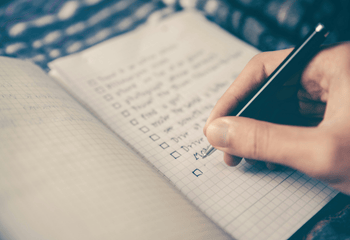What to Write in a Letter to Your Future Host Family
One of the most difficult tasks during your exchange application process is writing a letter to your future host family. It can be challenging to decide what to include when addressing people you have never met before. This blog post will explain the purpose of this letter, what topics you should cover, and important considerations when writing it. A well-written letter can help create a positive first impression and make your host family feel more comfortable about welcoming you into their home. Since this is one of the first chances to introduce yourself, taking the time to write a thoughtful letter can make a big difference.
What is this Host Family Letter for?
Most organizations provide host families with access to exchange student profiles, which include basic information such as name, age, and home country. Some profiles also feature an introductory video or a letter written by you. In many cases, host families use these profiles to decide which student they would like to welcome into their home. Since the letter is one of the few ways you can introduce yourself personally before meeting, it plays a key role in shaping your host family’s perception. A thoughtful letter can help demonstrate your enthusiasm, openness, and compatibility with the family’s lifestyle and values. It also gives your host family a better idea of what to expect, which can make your arrival and adjustment smoother.
Addressing Your Host Family
Choosing an appropriate greeting can help set a warm and inviting tone. A phrase such as “Dear future host family” sounds more personal than a simple “Hi.” . The goal is to create a welcoming and respectful introduction that sets the right tone for the rest of the letter. Starting with a friendly and polite greeting can also help ease any nervousness about writing to people you have not yet met.
Breaking the Ice
Starting the letter with an interesting or unexpected detail can make it more engaging and memorable. Mentioning a unique hobby, an unusual skill, or a favorite type of music can serve as a great conversation starter. For example, if you love country music, enjoy rock climbing, or have a passion for baking, including this in your introduction can help your host family get an immediate sense of your personality. A creative and engaging opening allows them to relate to your interests and may lead to shared experiences once you arrive. This small detail can make your letter stand out and create a strong first impression. Even a simple fun fact, like a favorite food or a pet’s name, can add personality to your introduction and make it easier for your host family to get to know you.
Introducing Yourself
After the opening, your letter should provide a brief introduction. Basic details such as your name, age, and current school year should be included, but since host families often receive a separate profile with this information, it is best to keep this section concise. Adding a few details that are not covered in the official profile can help make your introduction more engaging and personal. This could include details about your hometown, school environment, or favorite subjects. A brief mention of personality traits, such as being outgoing, curious, or adventurous, can also help your host family get a better sense of who you are. Sharing a little about your daily routine or what you enjoy doing in your free time can also make your introduction more engaging and personal.
Sharing Your Reasons for an Exchange Year
Explaining your motivations behind applying for an exchange year can help your host family understand your perspective. This section can include what aspects of the experience excite you the most, why you chose a specific country, and what personal goals you hope to achieve. You might be motivated by a desire to improve your language skills, experience a new culture, or become more independent. Sharing these reasons helps your host family understand what you hope to gain from the experience and how you might contribute to the cultural exchange within the household. Being open about your goals and what you are looking forward to can also show your enthusiasm and excitement about the experience.
Describing Your Everyday Life
A description of your daily life can help your host family get a sense of your routine and habits. This could include morning activities, such as breakfast traditions or responsibilities before school, as well as details about your school day. Describing how school works in your home country, including transportation, favorite subjects, or school traditions, can give your host family a clearer picture of what you are accustomed to. Additionally, mentioning any specific expectations or excitement about school in your host country can provide further insight. You may also want to share your weekend routines, family traditions, or special occasions that are meaningful to you, as this can provide a deeper understanding of your background and lifestyle. The more details you include, the easier it will be for your host family to picture your life and understand how you might fit into theirs.
Talking About Hobbies and Interests
Sharing your hobbies and interests is a great way to give your host family a sense of your personality and lifestyle. This can include activities you do after school or on weekends, such as playing an instrument, practicing a sport, or creative hobbies like painting or writing. Mentioning interests that you hope to explore during your exchange can also show enthusiasm and openness to new experiences. You might be interested in trying out a new activity, such as joining a local sports team or learning traditional dances from your host country. Discovering shared interests with your host family might also make the transition smoother and help create bonding opportunities once you arrive. If you have any specific activities you are looking forward to trying, mentioning them can help your host family think of ways to involve you in new experiences.
Describing Your Family Life
Providing some background about your family life can help your host family understand how you are used to interacting with relatives. This might include describing household responsibilities, traditions, or favorite family activities. Since your host family will be taking on a parental role, knowing what you are accustomed to can help them determine if their household would be a good fit. Additionally, mentioning any particular customs or celebrations that are important in your home country can serve as a way to introduce cultural exchange within the household. If you are used to spending a lot of time with family, enjoy family dinners, or have younger siblings, these details can help your host family get a clearer idea of how you might fit into their family dynamic. Being open about your experiences at home can also help set expectations and make it easier to adjust to new family routines.
Ending on a Positive Note
Closing your letter with gratitude and excitement can leave a strong impression. Thanking your host family for taking the time to read your letter and expressing appreciation for their willingness to host an exchange student shows respect and enthusiasm. Ending with a phrase such as “Best wishes,” “All the best,” or “Warm regards” helps maintain a polite and friendly tone. A short sentence expressing excitement about meeting your host family, experiencing their culture, or becoming part of their daily life can add a personal touch to the conclusion.
Honesty is Key
Being honest in your letter is essential. There is no need to exaggerate skills or experiences, as your host family will form expectations based on what you share. For example, claiming to be a great cook when you have little experience in the kitchen could lead to misunderstandings. Authenticity allows your host family to get to know you as you truly are, ensuring a better match for both parties. If there are any preferences or important considerations, it is better to mention them in a respectful way rather than leaving out key details. Honest communication fosters trust and sets realistic expectations for both you and your host family.
Conclusion
Writing a letter to your future host family is an opportunity to provide a personal introduction and establish a connection before arrival. Taking the time to share relevant details in an honest and engaging way can help create a strong first impression. A well-written letter not only provides useful information but also conveys enthusiasm and openness, which can help build a positive relationship even before your exchange begins.








